What parents/carers need to know about the Ofcom ‘Media use and attitudes’ report 2021
Ofcom’s annual ‘Children and Parents: Media Use and Attitudes’ report aims to provide a comprehensive picture of how young people use and experience the internet in any given year.
In the guide you’ll find information on areas including children’s online activities, popular apps and parental concerns.
https://nationalonlinesafety.com/hub/view/guide/ofcom-children-and-parents-media-use-and-attitudes-report-2020-21
10 Top Tips for Keeping Children Safe From Cyber Crime
Teaming up with the Yorkshire and Humber Regional Cyber Crime Unit to help you get wise to some common online offences. Do you know how to spot a phishing email? Can you trust public WiFi? And what you should you do if a young person becomes interested in hacking? Find out with the guide below:
https://nationalonlinesafety.com/hub/view/guide/cyber-crime
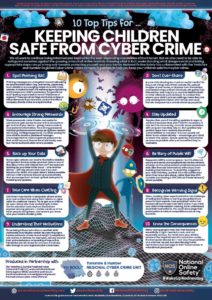
What Parents and Carers Need to Know About ‘Avakin Life’
A 3D ‘lifestyle simulator’ for mobiles, Avakin Life has a notable percentage of young teens among its 1.4 million daily users. But is the content really suitable for such an impressionable audience? With revealing outfits, suggestive dance moves and private chats with older users, it’s not difficult to see why at least one regional UK police force has already issued a safeguarding alert about the game.
It’s a game which prioritises physical appearances and material possessions. But that may be the least of Avakin Life’s issues. With a lack of age verification, players can easily pretend to be someone they’re not in this setting. Add in skimpy outfits, suggestive dancing and the facility to chat in private, and there’s a clear risk to the game’s younger teen users.
https://nationalonlinesafety.com/hub/view/guide/avakin-life

What Parents and Carers Need to Know About ‘Clubhouse’
Between May 2020 and January 2021, the value of audio chat discussion app Clubhouse soared from $100 million to $1 billion. Only available on Apple devices (for now), it’s currently ranked #7 in the App Store’s social networking chart: not too shabby for an app that users can only join by invitation.
Already a success on iOS devices and with an Android version in the works, invitation-only audio app Clubhouse has put a chic new slant on online debate and networking. But question marks over privacy and data protection, plus potentially contentious subject matter – like politics, race, sexuality and religion – have already raised concerns. So how safe is Clubhouse? How do you get invited? And is it suitable for young people?
https://nationalonlinesafety.com/hub/view/guide/clubhouse
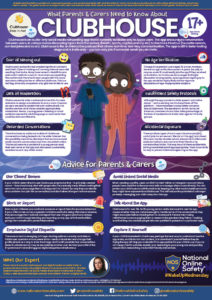
What Parents and Carers Need to Know About ‘Signal’
The multimedia messaging app Signal has been dubbed “an overnight success, years in the making”. The result of a merger between two older apps (TextSecure and RedPhone), Signal has been available since 2015, but didn’t gain notable popularity until the latter half of 2020 – since when it’s been downloaded by an additional 20 million users globally.
Co-founded by the man who also started WhatsApp, Signal has been one of the major beneficiaries from the controversy around WhatsApp’s changes to its privacy policy last year. The two apps have plenty in common, so it was hardly surprising that users leaving WhatApp would head for what for appeared to be a ready-made replacement. If anything, Signal is even more secure in terms of encryption. But is that necessarily a good thing in every context? Does Signal in fact make it easier to get away with bad behaviour online? And should young people be using it?
https://nationalonlinesafety.com/hub/view/guide/signal

Concerns over Omegle App
Online predators are using the live video chat site to take advantage of young boys and gather child sexual abuse materials, a BBC documentary has found. Omegle links random users together to engage in video or text chats and global child protection groups have voiced their concerns about the online risks it poses to children. One 15-year-old user described how she often comes across grown men acting inappropriately on the site. She says, “[Omegle] is like the dark web but for everyone.”
Access the Omegle safety guide: https://nationalonlinesafety.com/hub/view/guide/omegle
For more information follow the link below:
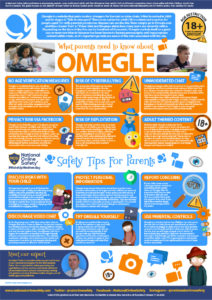
What Parents and Carers Need to Know About WhatsApp
With around two billion users, WhatsApp’s incorporation into the Facebook empire looked to have cemented its status as the market leader for messaging. But over recent months, the app – though still massively popular – has actually seen numbers dropping. As our guide discovers, though, the exodus may have been an over-reaction. We’ll also check out the other new features WhatsApp’s introduced. Why should parents and carers be aware of the ‘disappearing messages’ option? What has the app done to arrest the spread of fake news? And how does it help young people to start thinking more critically about things they might read online?
https://nationalonlinesafety.com/hub/view/guide/whatsapp
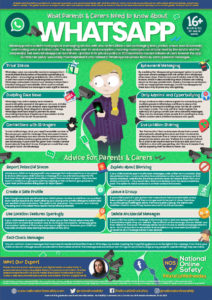
What Parents and Carers Need to Know About Smartphone Emergency SOS Functions
You might not know it – even if you have one – but most new smartphones include an array of emergency functions that could prove invaluable to you in a crisis. From sending notifications to specified contacts to connecting you rapidly with the emergency services, it’s no exaggeration to say that your phone could potentially save your life – or help you save someone else’s – in a matter of seconds.
This week, our guides outline how to use the SOS functionality on three of the most popular types of phone: iPhones, Samsung and Google. Find out how to make an emergency call with just five clicks of a button, how to notify first responders of essential medical information and how to automatically inform friends and family of your location.
https://nationalonlinesafety.com/guides/samsung-sos-call
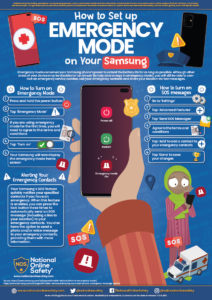
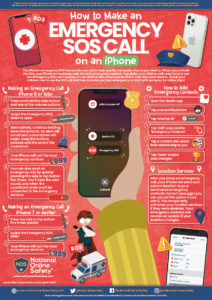
What Parents and Carers Need to Know About ‘Rec Room’
Rec Room is another one of those games which surged in popularity during the pandemic. It’s user base trebled in 2020, as players realised that the platform’s ‘open-world’ nature and interactivity were a way of replicating social contact. In-game events reflected that, with rooms set up to happy hours, birthday parties, maths tutorials and even therapy sessions.
Rec Room became an unexpected breakout hit on the Xbox after its release on that platform towards the end of last year. As a more sociable alternative to the fast-paced, hyper-violent titles that historically dominate the Xbox game charts, its only real rival is Roblox – which is played almost exclusively by under-16s. With such a young user population experiencing the intensifying nature of virtual reality gameplay – as well as having the ability to chat privately in-game – it’s easy to see why many people have voiced safety concerns. Rec Room is kidSAFE certified, but worries over online bullying and inappropriate content have persisted.
https://nationalonlinesafety.com/hub/view/guide/rec-room
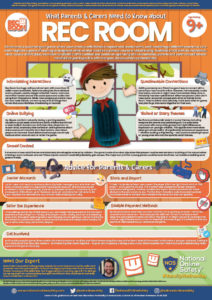
What Parents and Carers Need to Know About Chatroulette
Before Zoom, before Teams, there was Chatroulette. But users of that video calling software tended not to be offering anything as innocent as a quiz, and there was usually only one item on the agenda. A runaway word-of-mouth success on its launch in 2009, Chatroulette since seemed to have melted away into internet obscurity. But a surge of new users during lockdown appears to have brought it back from the brink. So what happens on Chatroulette calls? Is there really as much inappropriate content as popular opinion would suggest? Who uses the service? And is any part of it safe … at all? This week’s free #WakeUpWednesday guide investigates.
https://nationalonlinesafety.com/hub/view/guide/chatroulette
https://www.internetmatters.org/resources/online-gaming-advice/
Support for parents and carers to keep children safe online
Options for reporting or talking through online problems:
CEOP
The Child Exploitation and Online Protection (CEOP) Centre is dedicated to eradicating the sexual abuse of children. It is part of UK policing and very much about tracking and bringing offenders to account either directly or in partnership with local and international forces. Anybody with concerns that a pupil is being groomed or sexually exploited, including involvement in Sexting, should contact them directly using the link below. I would strongly recommend that if possible, you also contact Mr Lindsay or any member of the Safeguarding team here at Hurworth as we may need to make additional referrals to Children’s Services.
www.ceop.police.uk/safety-centre
Childline Instant Help
The link provided below will take you to the Childline website where you can click the explore button to find out more about topics such as Cyber Bullying and Online and Mobile Safety. More importantly if you click on the 1 to 1 Chat Online link you can contact a Childline counsellor in a 1 to 1 online chat (like instant messenger) about any online problems. Childline state that no problem is too big or too small.
ThinkUKnow
Here you can find the latest information on websites, mobiles and new technology. Find out what’s good, what’s not and what you can do about it. If you look after young people, there’s an area for you too with resources you can use at home or just to get yourself up to speed with the latest developments. Most importantly, there’s also a place which anyone can use to report if they feel uncomfortable or worried about someone they are chatting to online.
Here you can find a parents/carers guide to safely stream online and share images.
Delivering Online Safety at Home
Internet Watch Foundation
If you have inadvertently stumbled across potentially illegal online content, specifically images of child sexual abuse, criminally obscene material or anything that incites racial hatred then please submit a report to the Internet Watch Foundation (IWF). The IWF works in partnership with the police, government, the online industry and the public to combat this type of material and you are helping to make the internet safer for all by taking this action.
Options for finding information about online safety guidance:
All the websites listed above have both reporting tools and sections of information and advice relating to e-safety. In addition to these you may find the following useful:
The Twitter feed from the CEOP website has many tweets with up to date information about online safety. It covers the type of current activity taking place not only across the UK but also specifically what is happening regionally.
Get Safe Online
Get Safe Online is the UK’s leading source of unbiased, factual and easy-to-understand information on online safety.